- Home
- Franz Kafka
The Metamorphosis and Other Stories
The Metamorphosis and Other Stories Read online
Translation and Introduction © 2017 by Sterling Publishing Co., Inc.
Cover art © 2017 by Jessica Hische
Endpapers © by Jill_InspiredByDesign/iStock
All rights reserved. No part of this publication may be reproduced, stored in a retrieval system, or transmitted in any form or by any means (including electronic, mechanical, photocopying, recording, or otherwise) without prior written permission from the publisher.
ISBN: 978-1-4351-6506-9
Barnes & Noble, Inc.
122 Fifth Avenue
New York, NY 10011
sterlingpublishing.com
CONTENTS
Introduction
Before the Law
The Judgment
The Metamorphosis
The Stoker
In the Penal Colony
A Country Doctor
A Hunger Artist
A Report to an Academy
Children on the Country Road
Outing in the Mountains
A Message from the Emperor
The Window to the Street
Unmasking a Con Man
Resolutions
The Bachelor’s Misery
The Businessman
Absentminded Gazing
The New Advocate
The Passersby
The Passenger
In the Gallery
The Rejection
For Gentlemen Riders to Think About
The Sudden Stroll
Wish to Become a Red Indian
Jackals and Arabs
Unhappiness
The Way Home
An Old Manuscript
Clothing
A Visit to the Mine
The Next Village
The Cares of a Household Father
The Trees
Eleven Sons
A Fratricide
First Sorrow
A Dream
Acknowledgments
INTRODUCTION
I think we ought to read only the kind of books that wound or stab us. If the book we’re reading doesn’t wake us up with a blow to the head, what are we reading for? . . . A book must be the axe for the frozen sea within us.
Franz Kafka, 1904
Art is like a mirror which runs ahead like a clock, sometimes.
Franz Kafka, on Pablo Picasso
I
Franz Kafka is a pivotal representative of modern world literature. He wrote at a time when the powerful and inventive avant-garde movements of the first two decades of the 20th century broke with the artistic conventions of the 19th century—be it in painting, music, or literature—in order to express the fundamental social and political experiences of the “Age of Extremes” (Eric Hobsbawm) with its catastrophic wars, severe economic crises, and unprecedented industrialized mass killings. Early on, Kafka developed a keen sense for the fundamental problems of Western civilizations after 1900, especially for “power” in its many facets: he showed the anonymity of its mechanisms, its deep corruption, and its destructive nature and pervasive impact on all levels. He also showed the alienating and reifying effect of modern technology and work conditions.
II
Kafka’s biography seems, at first at least, uneventful and incon-spicuous. Born in 1883, he spent almost all of his life in his native city of Prague, the capital of Bohemia, which was part of the Austro-Hungarian Empire until it was dismantled at the end of World War I—the war it had crucially helped to launch. Kafka was a member of the small German-speaking Jewish community that was doubly isolated, from the small German ruling class (which tolerated the Jews) as well as from the vast Czech majority. Kafka’s father, the son of a kosher butcher, came from a small rural Czech village, married the well-educated daughter of a brewer, opened a store in the center of Prague, and became a successful “German businessman” who gave his children a German education so that they could become part of the German ruling class. But this typical upward mobility based on the ideology of liberal capitalism proved to be volatile, and it failed ultimately. For the young Kafka and other members of the German-Jewish intelligentsia, the social isolation of the “German ghetto” became so stifling and even paralyzing and the city itself so “surreal” that most tried to leave. Kafka’s life is indeed marked by his various attempts to escape from the “damaging influence” of his father and of the city, attempts which proved futile. But it was especially the contentious relationship to his father which motivated his writing.
Kafka studied law at the German university in his native city, was promoted to Dr. jur. in 1906, and worked from 1908 to 1922 at the semi-public Arbeiter-Unfall-Versicherung, a modern institution which confronted him with capitalist work conditions, modern machinery, and the mechanisms of large administrative bodies. Kafka rose in the ranks, became a competent expert in accident prevention, and was usually charged with writing yearly reports and public statements. During WWI he was declared indispensable but was nevertheless confronted with the rising number of invalids and the scope of human suffering. Ultimately, Kafka saw his job, his existence as an official and as a member of a vast organization, as part of his negative identity, since it also took time away from his writing (which otherwise is inconceivable without his professional experience). After he was diagnosed with tuberculosis in 1917, he had to spend extended periods of time in sanatoria, and finally arranged for early retirement in 1922 when he was thirty-nine.
Kafka undertook two other attempts to escape from the damaging influences in his life: one was through the rekindled interest in Jewish traditions, the other through trying to marry and start a family of his own. At first, Jewish culture had been a “distant legend” for most of Kafka’s Jewish friends, although soon many would be attracted to political and cultural Zionism as it developed in the Austro-Hungarian Empire, primarily in Vienna. The critique of capitalist liberalism and its problematic promises of social equality soon led to positions which were critical of a naïve belief in assimilation as well. While Kafka remained skeptical of political Zionism, he developed a keen interest in Eastern Jewish culture, Yiddish theatre, Hebrew, and the settlements in Palestine. He seriously considered emigration and asked a friend as late as 1923 to help with the registration and immigration procedures, obviously believing that he could overcome the typical lack of tradition, identity, and stability of the “notorious Western Jew.” Kafka’s attempts to marry and start a family failed though, “in a grandiose way” as Kafka himself put it. Twice he was engaged to a Jewish businesswoman from Berlin, and a third engagement in Prague failed as well. It was only during the last months of his life that he met a young Jewish woman, with whom he would move to Berlin. His retirement had made this possible. Finally, he had escaped Prague to live as an independent writer. But life was difficult in Berlin during the months of hyperinflation, Kafka’s illness worsened, and he had to return. On June 3, 1924, he died in a private clinic near Vienna. He is buried at the new Jewish cemetery in Prague, together with his parents—his three younger sisters were deported later and murdered by the invading Germans.
III
This collection contains—in new translation—all the texts Kafka wanted to preserve. In an informal will he left for his close friend Max Brod, he stated that only five books—The Judgment, The Stoker, The Metamorphosis, The Penal Colony, and A Country Doctor—and the story “A Hunger Artist” had “value” and should be preserved. He added that the few copies of the collection Contemplation (Betrachtung) might be kept as well but that the book should not be reprinted.
Even with regard to the listed works, Kafka did not wish anybody to take much trouble for them to be “handed down to posterity”; “on the contrary, should they dis
appear altogether, that would please me best. Only, since they do exist, I do not wish to hinder anyone who may want to, from keeping them.” In this statement and in a note written later, Kafka also stipulated that the fragmentary novels, letters, and diaries should be burnt, without exception. It seems that Kafka saw in them a mere document of failure, aesthetically, and even more so philosophically or ethically. As it is well known, Max Brod did not carry out his friend’s last will but successively published his great unfinished novels (The Trial, Amerika, The Castle) and stories, as well as the vast amount of letters, diaries,
and aphorisms Kafka had left behind—i.e., material which had not been published before and which had not even been intended for publication.
Like many of his friends, Kafka had started to write during his years while a student in Prague, and he continued to write during his years as an employee of the Workers’ Accident Insurance Institute, where he worked from 8 a.m. to 2 p.m. Kafka’s first book publication, Contemplation, contains eighteen relatively short texts, many of which had been written (and published) in the years before: literary miniatures which, much in the impressionistic style of the time, reflect on daily observations revealing the melancholic attitude of the merely reflecting and somewhat forlorn bystander. But Kafka soon wanted to go beyond this kind of self-centered, playful, even narcissistic literature; as early as 1904—Kafka was still a student and had written very little at that point—he demanded that we “ought to read only the kind of books that wound or stab us. If the book we’re reading doesn’t wake us up with a blow to the head, what are we reading for?” Literature that deserved its name should be “the axe of the frozen sea in us.” After four years at his job, dissatisfied with its routine and mindless bureaucracy, Kafka made the deliberate decision to set free the “immense world I feel in me” and search for a broad epic form to present this world. A first result of this deliberate quest is the novel Amerika (originally: The Man Who Disappeared [Der Verschollene]), in which sixteen-year-old Karl Rossmann is sent off to the New World where he will experience the impact of a frightening modern technology, the alienation of work, the social contradictions, and the lack of justice—famously, when Karl’s boat enters the harbor in New York, the Statue of Liberty carries a sword, not a torch. Kafka would ultimately abandon the novel but would publish just the introductory chapter under the title The Stoker.
While still working on Amerika, on September 22/23, 1912, Kafka wrote in one sitting and in a creative outburst, The Judgment (Das Urteil). The next day he was still taken by the intensity of this writing experience and stated: “Only in this way can writing be done, only with such coherence, with such a complete opening of the body and the soul. . . .[the] joy, how the story developed before me, as if I were advancing over water. . . . How everything can be said, how for everything, for the strangest fancies, there waits a great fire in which they perish and rise up again.” The Judgment, which was later published as a small book, indeed marks a decisive turning point in Kafka’s writing, for he breaks, at least in part, with the empirical representation of reality and incorporates fantastical, parabolic, and even grotesque forms of representation which make the text multidimensional, with puzzling, even shocking effects for the reader. Kafka shows the impact of a son’s decision to marry and the surprising, even grotesque power demonstration of a father who had been seen as senile and weak. Unlike the many Expressionist stories of the time, wherein the generation of sons are rebelling against the authority of their fathers and their social and political values, the sons in Kafka’s stories prove to be weaker than the fathers, whose disputed and problematic power position is a mirror image of the sons’ weakness (or guilt). In The Metamorphosis, a kind of companion story, it is the grotesque image which opens the text. The transformation into an insect, bug, or vermin (Ungeziefer) should be read as a graphic demonstration of Gregor Samsa’s true state, his miserable professional and family life; in other words Gregor is, in reality, a bug before the story which shows the effect of this visible transformation. In the Penal Colony shows another form of “punishment”—that was the title for the three stories which Kafka wanted to combine for publication, although In the Penal Colony seems to limit itself to the grotesqueness of a machine which inscribes the judgments literally onto the body, thus killing the delinquent. In The Penal Colony was written at the time when Kafka was working on his novel The Trial, which ends, like the other texts written in that period, with the execution of the hero, who ultimately accepts the guilt he could never understand.
In the following years Kafka would give up this ethical rigorousness that would lead to the annihilation of the hero. Instead, he would, as can be seen in the stories assembled in A Country Doctor, deal with questions of identity, the search for the right life (as the introductory story “The New Advocate” shows), hidden drives (in the title story), the question of assimilation (in “Jackals and Arabs,” “A Report to an Academy”), and the inability to cut through a deceiving mythical reality (as in the short text “On the Gallery”).
Kafka would publish one more book, the proofs of which he would correct on his deathbed in Kierling: A Hunger Artist. In the title story, Kafka reflects, as in other texts posthumously published, on the precarious role of the artist whose art literally culminates in death and who has to confess at the end that he was attracted to art because he “could not find food that I liked. Had I found it believe me I would (. . .) have eaten my fill like you and everyone.” It seems indeed that Kafka has lost the belief in art and the ability of the artist to communicate with the reading audience, the society. But there is also the notion, at the beginning of the text, that there was a time when the art the hero practices was appreciated. Literature—and art in general—has to be seen in its historical and social context. And thus, Kafka expresses in this story merely the uselessness of an art that is self centered and not oriented toward changing life and overcoming the pervasive forms of alienation which are all around us and destined to mark our century as well as the previous one.
—Jürgen Pelzer
Jürgen Pelzer studied German and comparative literature, history, and philosophy in Cologne, Constance, and Madison, Wisconsin, and is Professor of German Studies at Occidental College in Los Angeles. His main research areas are critical theory (Walter Benjamin, Siegfried Kracauer) and the cultural history of Germany, 1945 to the present.
BEFORE THE LAW
Before the law stands a doorkeeper. A man from the country comes to this doorkeeper and asks for entry into the law. But the doorkeeper says that he cannot grant him entry now. The man considers and then asks whether this means that he may be allowed to enter later. “It is possible,” says the doorkeeper, “but not now.” Since the gate to the law stands open, as always, and the doorkeeper has stepped aside, the man bends forward to see inside through the gate. As the doorkeeper notices this, he laughs and says: “If it is so tempting, go ahead and try to enter although I have forbidden it. But remember: I am powerful. And I am only the lowest doorkeeper. From hall to hall stand doorkeepers, each more powerful than the other. The sight alone of the third is even more than I can bear.” Such difficulties were something that the man from the country had not expected; after all, the law is supposed to be accessible to everyone all the time, he thinks, but as he now looks more closely at the doorkeeper in his fur coat, with his large, pointed nose, and long, thin, black Tartar’s beard, he decides that it is better to wait until he has received permission to enter after all. The doorkeeper gives him a stool and allows him to sit down to one side of the door. There he sits for days and years. He makes many attempts to be let in and tires the doorkeeper with his requests. The doorkeeper often carries out little interrogations with him, asks him about his homeland and many other things, but they are apathetic questions such as those asked by great men, and at the end, he always tells the man that he cannot let him in yet. The man, who equipped himself with many things for his journey, uses everything, however valuable it may be, to bribe
the doorkeeper, who accepts everything, but says: “I am only accepting this so you don’t believe you have left anything out.” During the many years, the man observes the doorkeeper almost continuously. He forgets the other doorkeepers; this first one seems to him to be the only hindrance to his entry into the law. He curses his bad fortune, recklessly and loudly in the first years, and later, as he becomes old, grumbling to himself. He becomes childish, and because he has been studying the doorkeeper for years and is familiar even with the fleas in the collar of his fur coat, he also asks the fleas to help him and change the doorkeeper’s mind. In the end his eyesight becomes weak and he doesn’t know whether it is truly growing darker, or whether his eyes are merely deceiving him. He does, however, discern a radiance among the darkness as it breaks forth inextinguishably from the door to the law. Now he has not much longer to live. Before his death, everything that he has experienced all this time collects in his head into one question that he had not yet asked the doorkeeper. He beckons him over, for he can no longer raise his stiffening body. The doorkeeper has to bend down low to him, as the difference in their height has changed very much to the man’s disadvantage. “What more do you want to know now?” asked the doorkeeper. “You’re insatiable.” “Everyone strives for the law, do they not?” said the man. “How can it be that in all these many years no one other than myself has requested entry?” The doorkeeper recognizes that the man is already near his end and, in order to manage to reach his fading ear, he shouts at him: “No one else could have been granted entry, for this entrance was intended only for you. I shall now go and close it.”
THE JUDGMENT
(For Fräulein Felice B.)
It was on a Sunday morning at the height of spring. Georg Bendemann, a young businessman, was sitting in his private room on the first floor of one of the low, poorly-built houses that extended along the river in a long row, discernable almost solely by their height and color. He had just finished a letter to a childhood friend now residing abroad; he lingered blithely as he sealed it, and then, his elbows resting on his desk, he gazed out the window at the river, the bridge, and the hills on the other bank with their fragile green.

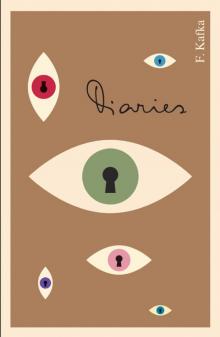 Diaries of Franz Kafka
Diaries of Franz Kafka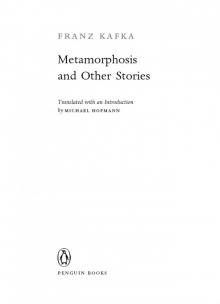 Metamorphosis and Other Stories
Metamorphosis and Other Stories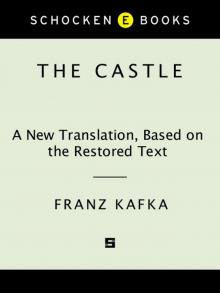 The Castle: A New Translation Based on the Restored Text
The Castle: A New Translation Based on the Restored Text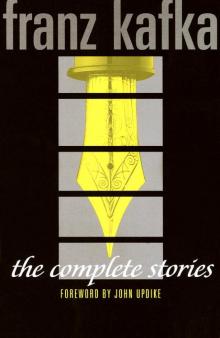 The Complete Stories
The Complete Stories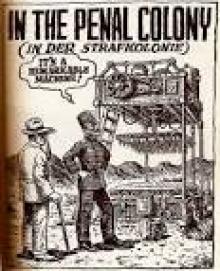 In the Penal Colony
In the Penal Colony The Trial
The Trial Amerika
Amerika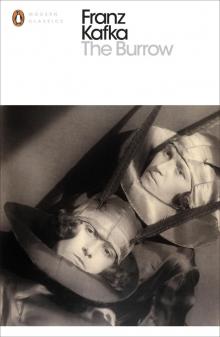 The Burrow: Posthumously Published Short Fiction
The Burrow: Posthumously Published Short Fiction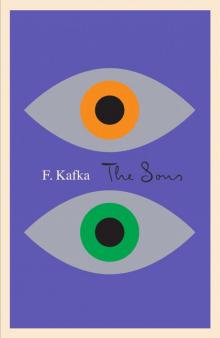 Sons
Sons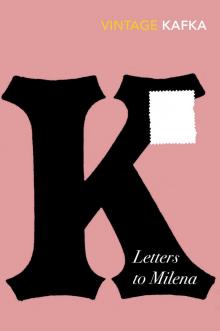 Letters to Milena
Letters to Milena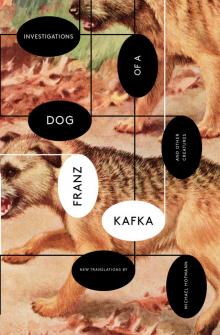 Investigations of a Dog: And Other Creatures
Investigations of a Dog: And Other Creatures Collected Stories
Collected Stories The Great Wall of China
The Great Wall of China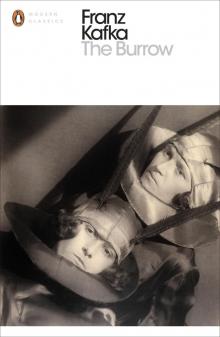 The Burrow
The Burrow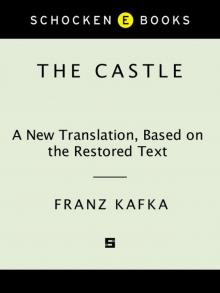 The Castle
The Castle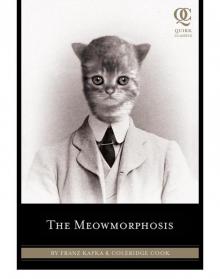 The Meowmorphosis
The Meowmorphosis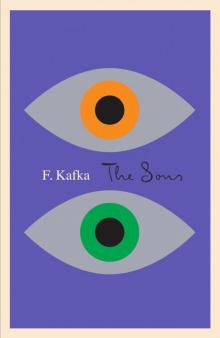 The Sons
The Sons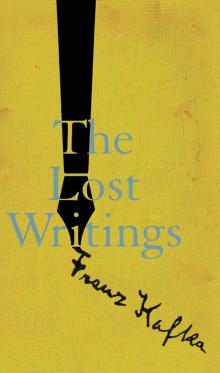 The Lost Writings
The Lost Writings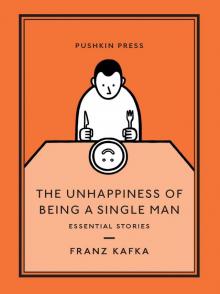 The Unhappiness of Being a Single Man
The Unhappiness of Being a Single Man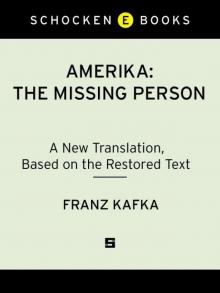 Amerika: The Missing Person: A New Translation, Based on the Restored Text
Amerika: The Missing Person: A New Translation, Based on the Restored Text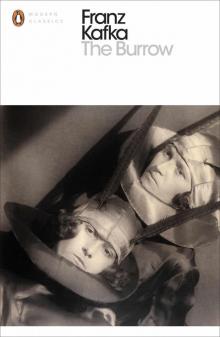 The Burrow: Posthumously Published Short Fiction (Penguin Modern Classics)
The Burrow: Posthumously Published Short Fiction (Penguin Modern Classics)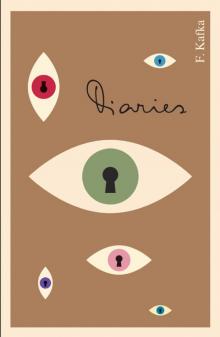 The Diaries of Franz Kafka
The Diaries of Franz Kafka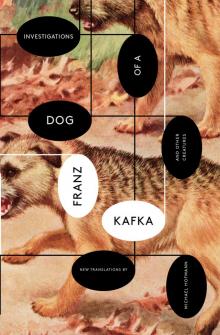 Investigations of a Dog
Investigations of a Dog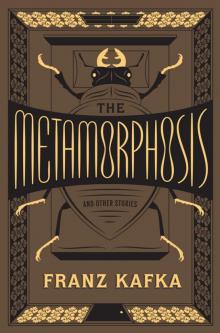 The Metamorphosis and Other Stories
The Metamorphosis and Other Stories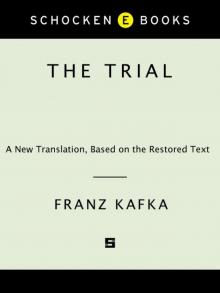 The Trial: A New Translation Based on the Restored Text
The Trial: A New Translation Based on the Restored Text